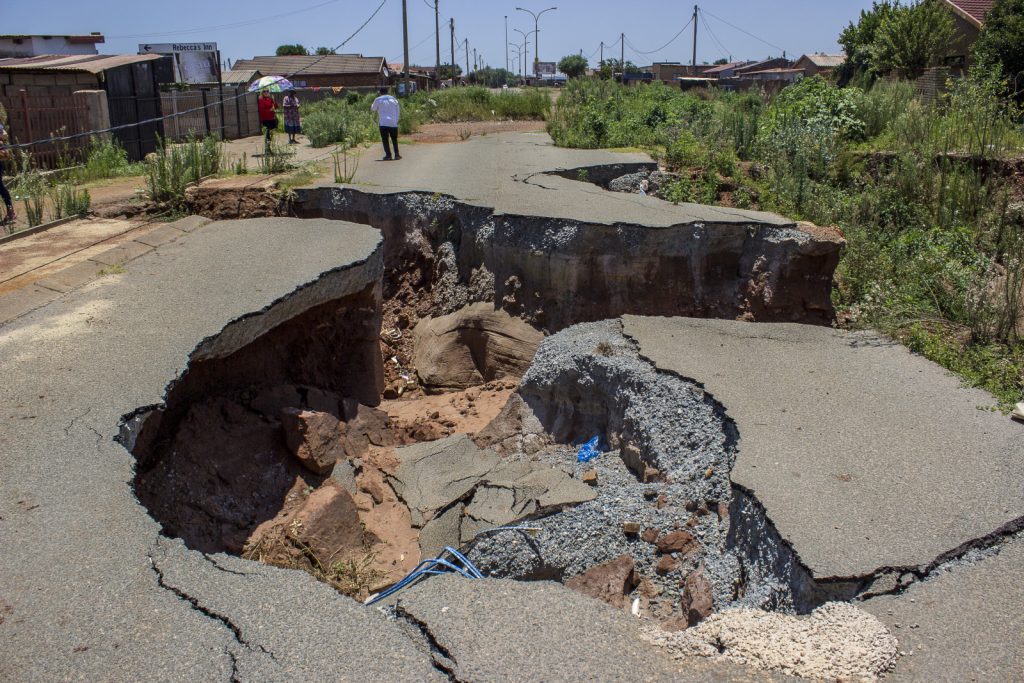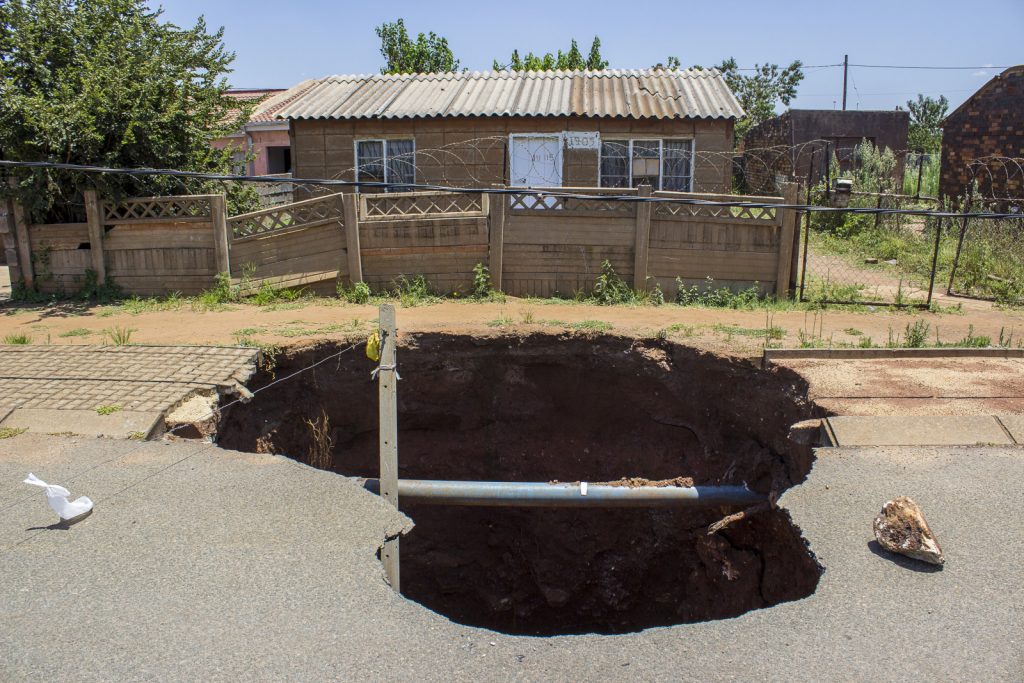Foul-up: Sinkholes swallow roads in Khutsong. Photos: Delwyn Verasamy
A look of pain passes over Mamokete Malebo’s face as she stares out the window of her empty bedroom. Her home in Khutsong, on Gauteng’s Far West Rand, is teetering on the edge of a sinkhole.
She tearfully recalls how the sinkhole formed during heavy rains in November 2021. “The house started shaking. It was very scary; my outside toilet and my neighbour’s toilet came tumbling down.”
Malebo had to leave her home and sleep with relatives because her house, which is riddled with large cracks, is in danger of collapsing.
“It’s not safe for us here,” she says.
Khutsong is underlain by dolomite and has long been ridden with sinkholes that have destroyed homes, roads and affected nearby schools.
Jerry Ramokgoatedi, a founder of the Khutsong Dolomite Risks and Vulnerability Community Support Group, says pervasive sewage pollution by the Merafong City local municipality has worsened the crisis.
Blocked, leaking and cracked pipes have allowed sewage to flow into the dolomitic bedrock, creating more sinkholes.
“Here, we are living with sinkholes and sewer spillages. With most of the sinkholes that occur you will see a sewage pipe, meaning that it was leaking underground. That’s why we say it’s poor maintenance.”
Ramokgoatedi points to sewage pouring from a blocked manhole into a sinkhole. “That sinkhole is caused by that leaking overflowing sewage and it’s been like this for years,” he says, adding that the sewage spills also make bigger sinkholes. “It’s a disaster and we are not safe here.”
Jacobeth Mngomezulu says she has to clean the sewage that floods her yard daily and forces her neighbours to move away.
“We don’t even open the windows [and] when it’s raining, I’m standing by the curtains, because I’m so scared we will all be swallowed by this sinkhole. Any day, we can die,” she says. “The RDP houses where they move people affected by sinkholes won’t be big enough for all my furniture or my family to live. I won’t go.”
In a letter to President Cyril Ramaphosa earlier this month, the group said the government and key stakeholders were ignoring the plight of Khutsong residents.
“The displayed attitude is no casualties, no response,” they said. “These sinkholes are not fenced or protected to prevent any possible loss of life or personal injuries of the public.”
Sewer spillages occur daily, and date back seven years, according to the letter. “The constant flow of human faeces into our residential area is our reality and no one cares. These unattended sewer spillages are exacerbating the occurrences of sinkholes, which occurred more than five years ago without being rehabilitated [and] attended.”
As he navigated pools of sewage on the streets and in yards, Klaas Rabele, also a member of the community support group, says human lives are being deliberately endangered. “When you’re living in a dolomitic area, no water ponding is allowed but you can see this sewage all over … These sinkholes spread like cancer.”
 Photos: Delwyn Verasamy
Photos: Delwyn Verasamy
Since 2019, a series of large sinkholes have gouged the road where Makgau Motlhabane lives. “They are just getting bigger and nothing is being done. The government has failed us and we won’t vote next year. What is the use? We are living in the danger zone and are tired of empty promises,” Motlhabane says.
Mariette Liefferink, the chief executive of the Federation for a Sustainable Environment, explained how, in the 1960s, the apartheid government authorised the dewatering of the gold-bearing reefs of the Far West Rand, which underlie dolomite, which led to the acceleration of sinkholes and subsidence depressions.
“Dolomite can form natural sinkholes, especially if there is ponding of water or if there is a broken pipe. This water causes the dissolution of dolomite. And so these constant sewage spillages and the dysfunctional wastewater treatment works have now resulted in these massive sinkholes in Khutsong,” she said.
In a letter to Liefferink in November, Sean Phillips, the director general of the department of water and sanitation, said the department was aware of the contraventions caused by malfunctioning sewer infrastructure operated by the Merafong City local municipality (MCLM).
“As a result of intensive monitoring of the four wastewater treatment works in Merafong, namely, Kokosi, Khutsong, Wedela and Welverdiend, the department initiated administrative enforcement actions against MCLM due to persistent non-compliance through issuing notices of intention to issue directives in terms of … the National Water Act [NWA]. This action was to compel MCLM to take rectification measures to curb pollution of water resources in the Wonderfonteinspruit catchment.”
He said follow-up inspections were done to establish compliance. “Evidence collected during the site inspections shows that MCLM continued to contravene provisions of the NWA and is failing to comply with the notices. Subsequently, directives were issued to all four wastewater treatment works.”
The MCLM submitted a representation to the department, but this was rejected because of the “inadequacy of the interventions”. An amended representation on 7 September last year was received, which the department is monitoring. Financial support has been given to the municipality to upgrade and refurbish sewer infrastructure.
 Photo: Delwyn Verasamy
Photo: Delwyn Verasamy
A 2020 report by the Merafong City local municipality says ageing infrastructure leads to sporadic pipe bursts, water leakages and losses that are costly to the municipality and “activates new sinkholes”.
It says that since 2016 new sinkholes formed at several sites in old Khutsong, which damaged internal water supply pipes to Khutsong extensions and sewer pipe networks that drain through outfall sewers to the Khutsong wastewater treatment plant. Their formation damaged water pipes, sewer pipes, infrastructure and property, according to the report. “This deteriorating situation places immense pressure on scarce resources to manage the risk, places lives and property in danger and negatively impacts on the social fabric and wellbeing of the community.”
The report says the critical situation has “become evident due to the collapsing of infrastructure because of dolomite activities and the severe health risk to residents caused by sewer flooding of residential areas and unacceptable levels of basic services, including water provision”.
Merafong municipality respond
Bridgette Mkhontwana, the acting communication manager for the Merafong City local municipality , said structural defects of houses, caused by ground instability related to sinkhole formation, regularly occurs.
The municipality has a responsibility under the National Buildings Regulations and Building Standards Act to ensure that people are safe from damaged and unstable structures.
“If the municipality therefore suspects that any of the above situations are applicable, the owner of the property is informed in writing of the same.” There is no obligation on the municipality to replace or to repair damaged houses unless the municipality was negligent and failed to discharge its duty towards the claimants.
Affected families are allocated RDP houses. “As the majority of formal houses in Khutsong are not covered by super structure insurance, therefore the provisions … of the National Housing Code be applied and that the equivalent of RDP housing be provided, irrespective of the size of the former house declared unsafe for occupation.”
The municipality has established the dolomite risk management committee, which is responsible for monitoring sinkhole-related matters.
Since the amalgamation of Khutsong in 1994, there was a culture of non-payment for municipal services and “in recent years, less than 5% of residents in Khutsong pay for their services.
“The non-payment … places a tremendous burden on the local authority to fit the bill for both Eskom and Rand Water … with the direct result that there was just no budget to do maintenance on municipal infrastructure, let alone filling vacant positions etc. This has led to a situation where Merafong City is listed as one of the 10 municipalities that need financial and administrative rescue.”
The municipality has sought assistance from the West Rand District Municipality, provincial disaster management centre and Gauteng department of human settlements, “from which our municipality hardly received any concrete assistance since 2002, until 2019, where the matter was once again escalated to the office of the president and national department of human settlement.
“It is only recently that a war room for the Khutsong intervention programme was established and funding [started] being prioritised for the Khutsong resettlement plan.”
Khutsong was established in 1958 on dolomite land before geological scrutiny was obligatory to ensure safe and acceptable development risks for towns, she said.